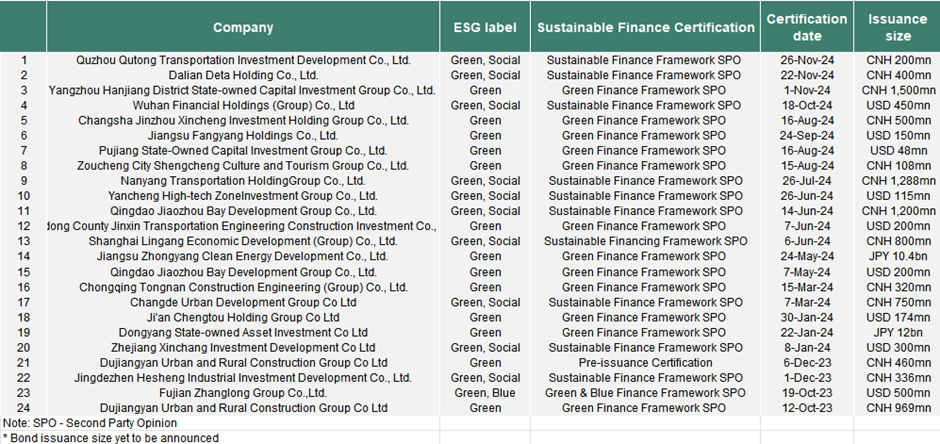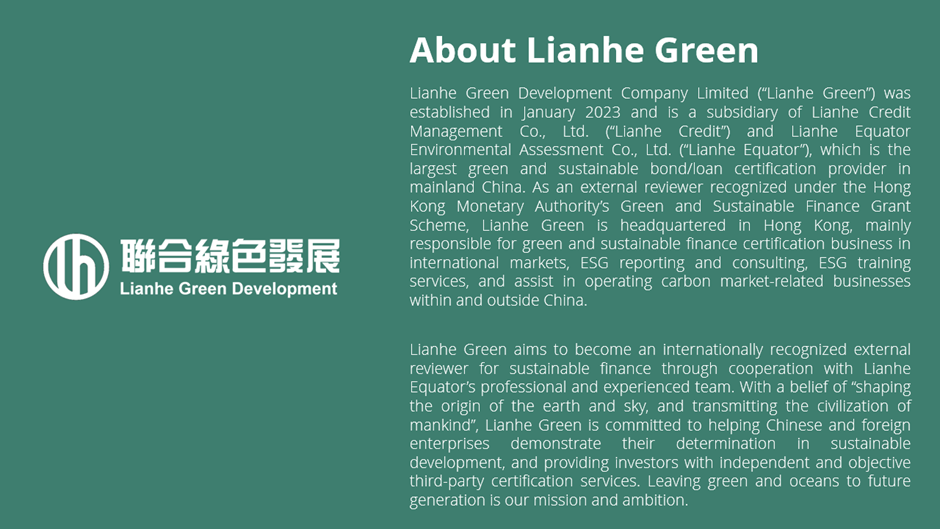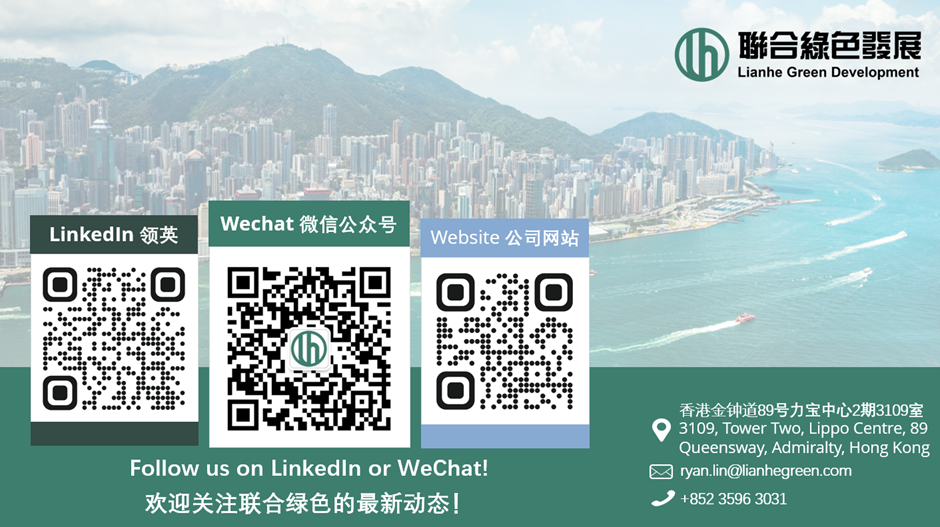所屬分類:新聞動態發佈時間:2024-12-30

Hong Kong China ESG trends
Hong Kong Sustainability Disclosure Roadmap Launched
The government launched the Hong Kong Sustainability Disclosure Roadmap on December 10th, outlining Hong Kong's approach to requiring publicly accountable entities (PAEs) to adopt the International Financial Reporting Standards - Sustainability Disclosure Standards (ISSB Standards) and providing a clear path for large PAEs to fully adopt the ISSB Standards no later than 2028.
Key points of the roadmap include the Hong Kong Institute of Certified Public Accountants developing the Hong Kong Standards on a full alignment basis with the ISSB Standards, with the goal of issuing the final Hong Kong Standards by the end of this year, effective from August 1st next year.
Starting from January 1, 2026, issuers that are constituents of the Hang Seng Composite LargeCap Index are required to disclose against the New Climate Requirements on a mandatory basis. The Hong Kong Exchanges & Clearing will consult the market in 2027 on mandating sustainability reporting against the Hong Kong Standards for listed PAEs, with an expected effective date of January 1, 2028, under a proportionate approach.
Source: https://www.news.gov.hk/eng/2024/12/20241210/20241210_140433_513.html
The HKMA Organises Green and Sustainable Banking Conference
The Hong Kong Monetary Authority (HKMA) held the "Green and Sustainable Banking Symposium" on December 11th, attracting about 400 participants from banks, technology companies, regulatory bodies, and academia.
One of the main objectives of the symposium was to provide a platform for the banking and technology sectors to discuss the role of low-carbon technologies and green fintech in Hong Kong and Mainland China's net-zero transition. Panel discussions covered how different types of low-carbon technologies (such as hydrogen energy, carbon capture, utilization, and storage, and smart energy management systems) can promote the net-zero transition, as well as how Hong Kong's banking industry can assist in the wider application of these technologies through lending and investment decisions.
Source:https://www.hkma.gov.hk/eng/news-and-media/press-releases/2023/12/20231211-4/
International ESG trends
Net-Zero Asset Owner Alliance Calls for Mandatory Scope 3 Disclosure
The UN-convened Net-Zero Asset Owner Alliance (NZAOA) is calling for mandatory regulatory mandates to address persistent challenges in Scope 3 emissions disclosure, which account for up to 75% of most companies’ total emissions.
In its latest paper, the Alliance emphasizes the need for credible and comparable Scope 3 data to drive meaningful reductions in the real economy. The report highlights global initiatives like the Corporate Sustainability Reporting Directive (CSRD) in the EU and emerging frameworks in Japan and California as critical steps toward standardized disclosure.
Source: ESG news (https://esgnews.com/net-zero-asset-owner-alliance-calls-for-mandatory-scope-3-disclosure/)
The United States Will Increase Import Tariffs on Chinese Solar-grade Polysilicon, Silicon Wafers, and Some Tungsten Products Starting From Early Next Year.
On December 11th, local time, the Office of the United States Trade Representative issued a statement saying that after a four-year review by the Biden administration, the U.S. will raise import tariffs on solar silicon wafers, polysilicon, and some tungsten products imported from China starting from the beginning of next year. The tariff rate on silicon wafers and polysilicon will be increased to 50%, and the tariff rate on some tungsten products will be increased to 25%. These tariff increases will take effect on January 1, 2025.
Source: China Energy News (https://mp.weixin.qq.com/s/AL_ZtbcLW9JZKTFb-3_0Aw)
Mainland China ESG trends
The Central Economic Work Conference Was Held in Beijing. Xi Jinping Delivered an Important Speech.
From December 11 to 12, the Central Economic Work Conference was held in Beijing. General Secretary of the Communist Party of China Central Committee, President of the People's Republic of China, and Chairperson of the Central Military Commission Xi Jinping attended the conference and delivered an important speech.
The conference held that this year is a crucial year for achieving the goals and tasks set in the 14th Five-Year Plan. The conference determined to jointly promote carbon reduction, pollution reduction, green expansion and growth, and accelerate the comprehensive green transformation of economic and social development. It will further deepen the reform of the ecological civilization system. It will create a healthy ecological environment for the development of green and low-carbon industries and foster new growth points such as green buildings. It will promote the achievement of important results in the landmark battles of the Three-North Shelter Forest Program and accelerate the construction of new energy bases in sandy areas, gobi deserts and wastelands. A number of zero-carbon industrial parks will be established, the construction of the national carbon market will be promoted, and a product carbon footprint management system and a carbon label certification system will be established. The battles to defend the blue sky, clear waters and clean soil will be continuously and thoroughly advanced. An action plan for the comprehensive treatment of solid waste will be formulated. Major projects for biodiversity protection will be implemented. The construction of the natural disaster prevention and control system will be strengthened.
Source: https://www.gov.cn/yaowen/liebiao/202412/content_6992258.htm
The China Cotton Association officially released the group standard for the carbon footprint of cotton.
On December 10th, the 5th member representative conference of the China Cotton Association was held in Beijing. During the conference, the group standard "Product Carbon Footprint - Product Category Rules - Raw Cotton" (T/COTCHN 004-2024) was officially released to the public. This is the first product carbon footprint standard in the cotton industry. This standard is an important part of the sustainable cotton standard system in China promoted by the association. It aims to encourage producers to adopt more scientific and environmentally friendly planting techniques and management measures, optimize the production process, and reduce resource consumption and emissions. Meanwhile, through carbon footprint assessment, it showcases the low-carbon and environmentally friendly characteristics of natural fibers and enhances the added value and market competitiveness of products.
Source: https://www.china-cotton.org/app/html/2024/12/11/98219.html
Notice on Soliciting Public Opinions on the "Guidelines for the Accounting and Reporting of Enterprise Greenhouse Gas Emissions in the Iron and Steel Industry" and the "Guidelines for the Verification Technology of Enterprise Greenhouse Gas Emissions in the Iron and Steel Industry"
To strengthen the management of enterprise greenhouse gas emissions and standardize the accounting, reporting and verification work of enterprise greenhouse gas emissions in the iron and steel industry, in accordance with the "Interim Regulations on the Administration of Carbon Emission Rights Trading", the Ministry of Ecology and Environment has organized the compilation of the "Guidelines for the Accounting and Reporting of Enterprise Greenhouse Gas Emissions in the Iron and Steel Industry" and the "Guidelines for the Verification Technology of Enterprise Greenhouse Gas Emissions in the Iron and Steel Industry", and is now soliciting public opinions.
The "Guidelines for the Accounting and Reporting of Enterprise Greenhouse Gas Emissions in the Iron and Steel Industry" stipulates the requirements for the accounting and reporting of greenhouse gas emissions at the enterprise level and process level for enterprises in the iron and steel industry, including the determination of accounting boundaries and emission sources, the accounting requirements at the enterprise level and the calculation of emissions, the accounting requirements at the process level and the calculation of emissions, the requirements for production data accounting, the requirements for data quality control plans, the requirements for regular reporting and the requirements for the format of information disclosure, etc.
The "Guidelines for the Verification Technology of Enterprise Greenhouse Gas Emissions in the Iron and Steel Industry" are applicable to the verification of greenhouse gas emission reports at the enterprise level and process level of key emitting units in the iron and steel industry in the national carbon emission rights trading market organized by provincial ecological environment departments. This guideline stipulates aspects such as the principles, bases, contents and key points of verification.
Source: https://www.mee.gov.cn/xxgk2018/xxgk/xxgk06/202412/t20241205_1098103.html
Sustainable Finance Certification Public and Completed by Lianhe Green



